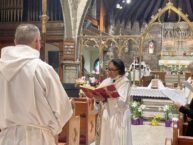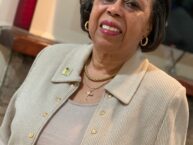July 3, 2016:  May God’s words alone be spoken, may God’s words alone be heard. Amen.
May God’s words alone be spoken, may God’s words alone be heard. Amen.
What a storm we had Friday night, right? A tornado warning around these parts, and up where I live, we were without power for about 45 minutes. I swear, at one point, I saw an ark going by, and it got me to thinking about a story I heard a few years back. It’s about an old man who is sitting on his porch watching the rain fall. Pretty soon the water was coming over the porch and into the house. The old man was still sitting there when a rescue boat came and the people on board said, “You can’t stay here you have to come with us.” The old man replied, “No, God will save me.” So the boat left.
A little while later the water was up to the second floor, and another rescue boat came, and again told the old man he had to come with them. The old man again, this time from the window on the second floor, replied, “God will save me.” So the boat left him again.
An hour later the water was up to the roof, where the old man now sat, and a third rescue boat approached the old man, and tried to get him to come with them. Again the old man refused to leave stating that, “God will save me.” So the boat left him again.
Soon after, the man drowns and goes to heaven, and when he sees God he asks, “Why didn’t you save me?” God replied, “You foolish man! I tried. I sent three boats after you!!”
I thought about this story when I read the Hebrew testament lesson for this week. It is one of the most intriguing and wonderfully constructed narratives. We are told that Naaman is a powerful Aramean warrior (present day Syria) – a great General. And, he is facing his worst enemy. Now if this enemy were one with a spear in hand, or riding a horse, it is no doubt that Naaman would win the battle easily. But, this General is facing something he cannot defeat with a sword, or even on his own.
Naaman has a skin disease, he has leprosy. Then one day, he is told it could be cured by a prophet in Samaria. Now, the interesting bit here is that the information about the prophet who could cure him came not from a loud voice from the clouds, nor from a powerful king, but from a servant. More than that, the servant was a young Israelite girl captured by Naaman’s forces.
Now Naaman, after getting permission from his king, heads off to Samaria with loads of treasures for the king of Israel, so that he might be healed. When the General arrives in Samaria loaded with gifts of money and garments for the king, the king thinks his request to be healed is some sort of trick to create war – oh the webs of distrust we weave. Then Naaman is saved again by another servant, who tells him of the prophet Elisha (we heard all about Elisha last week, right?). Naaman hauls the gifts over to Elisha’s house, and standing there, with chariot and horses, grander than life, he awaits the prophet. And here it gets even more interesting.
The prophet does not greet him, he sends a servant. A servant – the third servant in this tale! The servant tells him that all Naaman has to do is go take a bath seven times in the Jordan.
No great quest, no conquering mountains or sea… just grab a rubber ducky, a loofa, and a towel, and take a bath seven times. Now you’d think he’d be relieved by that – how easy can it get? But, Naaman is furious and storms off – he cannot believe that Elisha did not greet him personally, and heal him by waving his arms about and calling down his God from the heavens. Now were it not for servants, who once again come to his rescue, saying – “hey, not for nuthin’ but what can it hurt?” the General would have been lost for his own expectations of how this should all go down.
Fortunately for Naaman, he was able to hear the messages he was getting from the least of those in his world. He humbled himself, abandoned his expectations, and he was cured. In fact, his skin was made like a young boy the text says. As one commentator put it, “the great man, through the intercession of the little girl, is made like a little boy.” At the end of this story, I can just imagine this great warrior Naaman singing the Garth Brooks song, “I’ve got friends in low places…”
This scripture story, and the one about the man in the flood, have so much to teach us–about our expectations and our perception of ourselves and the world around us. We often are wrapped up in our own little spheres of life, our own great expectations of how God works, that we cannot see the joy and life giving presence of God right in front of us. We cannot imagine that God’s grace and love comes to us just by asking for it.
Or, we ask for it, but like the old man waiting in his house to be delivered, and like Naaman expecting Elisha to wave his hands around in some great spectacle, we decide it has to come in a certain way. We become rooted in our expectations, so much so, that we cannot see the salvation that awaits us to accept it. We cannot imagine that our deliverance may just come from the voice of the least of these, or in the whisper of the sustaining presence of the Holy Spirit in our times of greatest need.
I think we often make that same mistake today.
We tell God what we want God to do – get me this job, heal my loved one, end the hate and violence that we as humans have created in the world. And, when these things happen, when what we pray for comes in the way we hoped it would we say, “Thanks be to God!” But, when it does not – when the house must be foreclosed on, when someone we love dies, when the horrors of hate and violence ravage on, we can feel lost asking, “Where is God in all this?”
“Where is God in all this?”
It is easy to see God at work when things are going well. But, in these times of dark Night in our lives we can sometimes come to believe that the Dawn and the Day will never happen.[1] Each of us, with all the violence of the world today, along with our own deeply personal moments of enveloping darkness, can miss the light in the midst of the darkness – the resurrection that is always present in death. We can struggle to imagine life will be any different. And in that struggle, in that despair, we may very well miss the light, love, and grace that is present with us – there waiting for us to embrace it, if only we would take notice.
We, like Naaman, expect miracles to be the ones that we define. Like our old man in the house, we expect God to quell the waters, rather than sending a small boat. We are thinking in human terms, with human expectations, and human understandings of God’s universe.
Where is God in all this?
Elie Weisel certainly wanted to know.
Weisel, who passed away yesterday, was famous for his seminal work Night, among many other works, which came out of his experience as a teenage prisoner in the Auschwitz and Buchenwald concentration camps of Nazi Germany. Truly the longest of nights of horror. In Night, he said “Never shall I forget those flames which consumed my faith forever. Never shall I forget that nocturnal silence which deprived me, for all eternity, of the desire to live. Never shall I forget those moments which murdered my God and my soul and turned my dreams to dust. Never shall I forget these things, even if I am condemned to live as long as God Himself. Never.”
And yet, before receiving the Nobel Peace Prize, he was asked why God would allow the Holocaust. He said, “I have not answered that question, but I have not lost faith in God. I have moments of anger and protest. Sometimes I’ve been closer to him for that reason.”
I must admit that his experience would have challenged my faith – truly. And yet, Weisel seemed to come to an understanding about God that is elusive to many of us, part of which is that humanity has an unusual ability to be cruel, but that God is at work in our lives, and in the world around us, in ways unimaginable. God’s saving grace comes to all of us, and often in the most unlikely ways – in the face of the homeless, a newborn baby, the aged and the sick. God is present with the one who is in a day to day struggle of moving through grief, in the depressed person’s choice to get out of bed in the morning, in the person in program taking it one-day-at-a-time. And God is present even in the midst of horror unspeakable – aching with pain for what we do to one another.
Through all of it, through all that life throws at us, God will always choose to heal us – but we must also choose. We must be willing to step outside our expectations of how God should act in this world, to see the God that is. We need to let go of our own definitions of what that will look like, so that we can truly experience God in our lives, so that we can be open to Christ’s healing presence, so that we can live out the gospel.
Life will give us a lot of ups and downs. Hopefully far more up than down. Lately, to be sure, we have all been bruised and worn out in the day to day of the violence, hatred, and fear of the news – it seems unending. And for some of you, I know, life has been especially hard of late – family strife, loss of a loved one, loss of a job, difficulties in marriages, or even the uncertainty of being at a spiritual crossroad.
To be healed, we have to first admit to being broken – for many of us, that part is easy – the pain is far too real – the brokenness too fresh. To be healed, like Naaman, we also have to let go of our pride, our arrogance, our loaded expectations of what healing should look like, or who will be the one to show us the way to it (remember it was those on the margins who brought Naaman to his own healing). But perhaps most especially, to be healed, we have to let go of our natural inclination to blame ourselves, to blame others, to blame God because no one is immune from pain, no one should ever beat themselves up for what might have been, or what we wish had happened, and no one ever deserves to be pained in any way – physically, emotionally, or spiritually. No one.
From the moment we are born, we are going to experience unbelievable joys and sorrows unimaginable. We are human, capable of amazing things, but also of horrific ones – capable of mistakes, of hurting others, of hurting ourselves or allowing others to hurt us (whether we know we are doing it or not). But through it all – with us at every moment – good and bad – is God – rejoicing with us, and grieving with us, but most especially – loving us. This gift of healing love is freely ours and open to everyone. We only need to open our eyes to see it, open our hearts to experience it, open our arms to pass it on to others. We only need to drop our expectations of how God should work in our lives, and open ourselves to how God is working in our lives and all around the world.
And that is a risk – a risk that we might just find out that we don’t do this life thing all on our own, that sometimes bad things will happen, and it isn’t our fault, or there wasn’t anything we could have done better – that it is just the unfortunate part of being a human – something we cannot control or box-in – a risk that we will realize that we sometimes need help. A risk that healing comes from letting go, rather than hanging on.
We also have to risk making a mistake. We have to risk getting hurt. We have to risk looking foolish. We have to risk finding out that our convictions about the world just might not be right. We have to risk that the way in which God works in our lives might not be what we thought…but it will always BE!
And once we have done that, once we have taken that risk and opened ourselves up to see the God that is there offering healing grace to us, then we will have a choice…we can get in the boat or stubbornly stay in the house that will drown us of all life. We can get in the river, or stand on the banks mired in the mud of our disappointment and pain.
The choice is ours – it always was.
To be sure, there is a reason Naaman had to dip seven times, because healing can sometimes take awhile. And all of us need to understand that healing can be a very personal thing, and everyone will come to it in their own way, and in their own time. Some will need only one dip, and others far more than seven. But either way, we first have to risk seeing the grace, and taking that first step toward it. It is a risk of being changed – a step toward healing – and all of it is worth taking, for ourselves, and all the world.
And on this holiday weekend, my we remember the risks that others before us made to create this nation; and as Christians, never forget that the ideals reflected in that early vision, were not initially given to all, and that we still have a long way to go to have them fully realized here and all around the world. And because that is true, we must always strive to proclaim – that all people, creatures, and the earth itself are to be treated with dignity, respect, and love, because all are part of God’s creation; and, because it is what we are called to do. Christ is sending us, as he did with his disciples in the Gospel today – he is sending us out to be healing agents in the world – to be, like Elie Weisel, a prophetic witness for justice and peace.
May God give us the grace to work tirelessly in the name of Christ so that all people may be healed in the knowledge of God’s love, and that all of creation may thrive in peace.
Amen.
For the audio from the 10:30am service, click here:
[1] Those who know Elie Wiesel, a prophetic witness to peace in the world who died yesterday, will recognize that I was using the titles of his most famous works – Night, Dawn, and Day.
The Rev. Diana L. Wilcox
Christ Church in Bloomfield & Glen Ridge
July 3, 2016
Pentecost 7 – Year C
1st Reading – 2 Kings 5:1-14
Psalm 30
2nd Reading – Galatians 6:1-16
Gospel – Luke 10:1-11, 16-20






